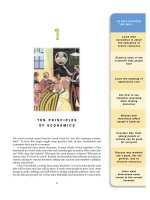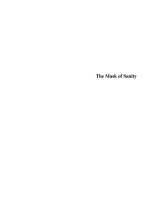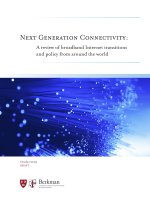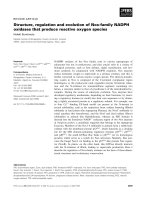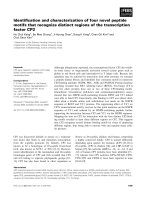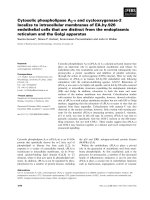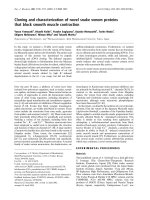Prisoners Of Geography _ Ten Maps That Explain Everything About The World.pdf
Bạn đang xem bản rút gọn của tài liệu. Xem và tải ngay bản đầy đủ của tài liệu tại đây (4.1 MB, 161 trang )
Tai Lieu Chat Luong
Scribner
AnImprintofSimon&Schuster,Inc.
1230AvenueoftheAmericas
NewYork,NY10020
www.SimonandSchuster.com
Copyright2015byTimMarshall
FirstpublishedinGreatBritainin2015byElliottandThompsonLimited
PublishedbyarrangementwithElliottandThompsonLimited
Allrightsreserved,includingtherighttoreproducethisbookorportionsthereofinanyformwhatsoever.Forinformation,address
ScribnerSubsidiaryRightsDepartment,1230AvenueoftheAmericas,NewYork,NY10020.
FirstScribnerhardcovereditionOctober2015
SCRIBNERanddesignareregisteredtrademarksofTheGaleGroup,Inc.usedunderlicensebySimon&Schuster,Inc.,thepublisher
ofthiswork.
Forinformationaboutspecialdiscountsforbulkpurchases,pleasecontactSimon&SchusterSpecialSalesat1-866-506-1949or
TheSimon&SchusterSpeakersBureaucanbringauthorstoyourliveevent.Formoreinformationortobookanevent,contactthe
Simon&SchusterSpeakersBureauat1-866-248-3049orvisitourwebsiteatwww.simonspeakers.com.
InteriordesignbyJillPutorti
JacketdesignbyJayaMiceli
JacketMaps©NicholasBelton/E+/GettyImages,HistoricMapWorksLLC/GettyImages,EncyclopaediaBritannica/UIG/Universal
ImagesGroup/GettyImages,Zorani/E+/GettyImages,Ideabug/E+/GettyImages,Buyenlarge/ArchivePhotos/GettyImages,NewYork
PublicLibrary/ScienceSource/GettyImages
LibraryofCongressCataloging-in-PublicationDataisavailable.
ISBN978-1-5011-2146-3
ISBN978-1-5011-2148-7(ebook)
CONTENTS
Introduction
1Russia
2China
3UnitedStates
4WesternEurope
5Africa
6TheMiddleEast
7IndiaandPakistan
8KoreaandJapan
9LatinAmerica
10TheArctic
Conclusion
Acknowledgments
AbouttheAuthor
Bibliography
Index
ToJoannaSimone:“L’histoiredemavie—c’esttoi.”
INTRODUCTION
VladimirPutinsaysheisareligiousman,agreatsupporteroftheRussianOrthodoxChurch.Ifso,he
maywellgotobedeachnight,sayhisprayers,andaskGod:“Whydidn’tyouputsomemountainsin
Ukraine?”
If God had built mountains in Ukraine, then the great expanse of flatland that is the North
EuropeanPlainwouldnotbesuchencouragingterritoryfromwhichtoattackRussiarepeatedly.Asit
is,Putinhasnochoice:hemustatleastattempttocontroltheflatlandstothewest.Soitiswithall
nations,bigorsmall.Thelandscapeimprisonstheirleaders,givingthemfewerchoicesandlessroom
to maneuver than you might think. This was true of the Athenian Empire, the Persians, the
Babylonians,andbefore;itwastrueofeveryleaderseekinghighgroundfromwhichtoprotecttheir
tribe.
Thelandonwhichwelivehasalwaysshapedus.Ithasshapedthewars,thepower,politics,and
socialdevelopmentofthepeoplesthatnowinhabitnearlyeverypartoftheearth.Technologymay
seemtoovercomethedistancesbetweenusinbothmentalandphysicalspace,butitiseasytoforget
thatthelandwherewelive,work,andraiseourchildrenishugelyimportantandthatthechoicesof
thosewholeadthesevenbillioninhabitantsofthisplanetwilltosomedegreealwaysbeshapedby
therivers,mountains,deserts,lakes,andseasthatconstrainusall—astheyalwayshave.
Overallthereisnoonegeographicalfactorthatismoreimportantthananyother.Mountainsare
no more important than deserts, nor rivers than jungles. In different parts of the planet different
geographicalfeaturesareamongthedominantfactorsindeterminingwhatpeoplecanandcannotdo.
Broadly speaking, geopolitics looks at the ways in which international affairs can be understood
through geographical factors: not just the physical landscape—the natural barriers of mountains or
connections of river networks, for example—but also climate, demographics, cultural regions, and
access to natural resources. Factors such as these can have an important impact on many different
aspects of our civilization, from political and military strategy to human social development,
includinglanguage,trade,andreligion.
Thephysicalrealitiesthatunderpinnationalandinternationalpoliticsaretoooftendisregarded
inbothwritingabouthistoryandincontemporaryreportingofworldaffairs.Geographyisclearlya
fundamentalpartofthe“why”aswellasthe“what.”Take,forexample,ChinaandIndia:twomassive
countries with huge populations that share a very long border but are not politically or culturally
aligned.Itwouldn’tbesurprisingifthesetwogiantshadfoughteachotherinseveralwars,butinfact,
apart from one monthlong battle in 1962, they never have. Why? Because between them is the
highest mountain range in the world, and it is practically impossible to advance large military
columnsthroughorovertheHimalayas.Astechnologybecomesmoresophisticated,ofcourse,ways
areemergingofovercomingthisobstacle,butthephysicalbarrierremainsadeterrent,andsoboth
countriesfocustheirforeignpolicyonotherregions,whilekeepingawaryeyeoneachother.
Individualleaders,ideas,technology,andotherfactorsallplayaroleinshapingevents,butthey
are temporary. Each new generation will still face the physical obstructions created by the Hindu
KushandtheHimalayas,thechallengescreatedbytherainyseason,andthedisadvantagesoflimited
accesstonaturalmineralsorfoodsources.
I first became interested in this subject when covering the wars in the Balkans in the 1990s. I
watched close at hand as the leaders of various peoples, be they Serbian, Croat, or Bosniak,
deliberatelyremindedtheir“tribes”oftheancientdivisionsand,yes,ancientsuspicionsinaregion
crowded with diversity. Once they had pulled the peoples apart, it didn’t take much to then push
themagainsteachother.
The River Ibar in Kosovo is a prime example. Ottoman rule over Serbia was cemented by the
BattleofKosovoPoljein1389,foughtnearwheretheIbarflowsthroughthecityofMitrovica.Over
thefollowingcenturiestheSerbpopulationbegantowithdrawbehindtheIbarasMuslimAlbanians
gradually descended from the mountainous Malesija region into Kosovo, where they became a
majoritybythemid-eighteenthcentury.Fast-forwardtothetwentiethcenturyandtherewasstilla
clearethnic-religiousdivisionroughlymarkedbytheriver.Thenin1999,batteredbyNATOfrom
the air and the Kosovo Liberation Army on the ground, the Yugoslav (Serbian) military retreated
acrosstheIbar,quicklyfollowedbymostoftheremainingSerbpopulation.Theriverbecamethede
factoborderofwhatsomecountriesnowrecognizeastheindependentstateofKosovo.
MitrovicawasalsowheretheadvancingNATOgroundforcescametoahalt.Duringthethreemonthwar,therehadbeenveiledthreatsthatNATOintendedtoinvadeallofSerbia.Intruth,the
restraints of both geography and politics meant the NATO leaders never really had that option.
Hungaryhadmadeitclearthatitwouldnotallowaninvasionfromitsterritory,asitfearedreprisals
againstthe350,000ethnicHungariansinnorthernSerbia.Thealternativewasaninvasionfromthe
south,whichwouldhavegottenthemtotheIbarindouble-quicktime;butNATOwouldthenhave
facedthemountainsabovethem.
IwasworkingwithateamofSerbsinBelgradeatthetimeandaskedwhatwouldhappenifNATO
came:“Wewillputourcamerasdown,Tim,andpickupguns”wastheresponse.Theywereliberal
Serbs,goodfriendsofmineandopposedtotheirgovernment,buttheystillpulledoutthemapsand
showedmewheretheSerbswoulddefendtheirterritoryinthemountains,andwhereNATOwould
grindtoahalt.ItwassomerelieftobegivenageographylessoninwhyNATO’schoicesweremore
limitedthantheBrusselsPRmachinemadepublic.
An understanding of how crucial the physical landscape was in reporting news in the Balkans
stoodmeingoodsteadintheyearsthatfollowed.Forexample,in2001,afewweeksafter9/11,Isaw
a demonstration of how, even with today’s modern technology, climate still dictates the military
possibilitiesofeventheworld’smostpowerfularmies.IwasinnorthernAfghanistan,havingcrossed
the border river from Tajikistan on a raft, in order to link up with the Northern Alliance (NA)
troopswhowerefightingtheTaliban.
The American fighter jets and bombers were already overhead, pounding Taliban and al-Qaeda
positionsonthecold,dustyplainsandhillseastofMazar-e-Sharifinordertopavethewayforthe
advanceonKabul.AfterafewweeksitwasobviousthattheNAweregearinguptomovesouth.And
thentheworldchangedcolor.
ThemostintensesandstormIhaveeverexperiencedblewin,turningeverythingamustard-yellow
color.Attheheightofthestormyoucouldn’tseemorethanafewyardsaheadofyou,andtheonly
thingclearwasthattheAmericans’satellitetechnology,atthecuttingedgeofscience,washelpless,
blindinthefaceoftheclimateofthiswildland.Everyone,fromPresidentBushandtheJointChiefs
ofStafftotheNAtroopsontheground,justhadtowait.Thenitrainedandthesandthathadsettled
oneverythingturnedintomud.Theraincamedownsohardthatthebaked-mudhutswewereliving
inlookedasiftheyweremelting.Againitwasclearthatthemovesouthwasonholduntilgeography
finishedhavingitssay.Therulesofgeography,whichHannibal,SunTzu,andAlexandertheGreat
allknew,stillapplytotoday’sleaders.
More recently, in 2012, I was given another lesson in geostrategy: As Syria descended into fullblowncivilwar,IwasstandingonaSyrianhilltopoverlookingavalleysouthofthecityofHamaand
sawahamletburninginthedistance.Syrianfriendspointedoutamuchlargervillageabouta mile
away, from where they said the attack had come. They then explained that if one side could push
enoughpeoplefromtheotherfactionoutofthevalley,thenthevalleycouldbejoinedontoother
landthatledtothecountry’sonlymotorway,andassuchwouldbeusefulincarvingoutapieceof
contiguous,viableterritorythatonedaycouldbeusedtocreateamini-stateletifSyriacouldnotbe
put back together again. Where before I saw only a burning hamlet, I could now see its strategic
importanceandunderstandhowpoliticalrealitiesareshapedbythemostbasicphysicalrealities.
Geopoliticsaffectseverycountry,whetheratwar,asintheexamplesabove,oratpeace.Therewill
be instances in every region you can name. In these pages I cannot explore each one: Canada,
Australia, and Indonesia, among others, get no more than a brief mention, although a whole book
couldbedevotedtoAustraliaaloneandthewaysinwhichitsgeographyhasshapeditsconnections
withotherpartsoftheworld,bothphysicallyandculturally.InsteadIhavefocusedonthepowersand
regionsthatbestillustratethekeypointsofthebook,coveringthelegacyofgeopoliticsfromthepast
(nation-forming);themostpressingsituationswefacetoday(thetroublesinUkraine,theexpanding
influenceofChina);andlookingtothefuture(growingcompetitionintheArctic).
InRussiaweseetheinfluenceoftheArctic,andhowitlimitsRussia’sabilitytobeatrulyglobal
power.InChinaweseethelimitationsofpowerwithoutaglobalnavy.ThechapterontheUnited
Statesillustrateshowshrewddecisionstoexpanditsterritoryinkeyregionsallowedittoachieveits
moderndestinyasatwo-oceansuperpower.Europeshowsusthevalueofflatlandandnavigablerivers
inconnectingregionsandproducingacultureabletokick-startthemodernworld,whileAfricaisa
primeexampleoftheeffectsofisolation.
ThechapterontheMiddleEastdemonstrateswhydrawinglinesonmapswhile disregarding the
topographyand,equallyimportant,thegeographicalculturesinagivenareaisarecipefortrouble.
Wewillcontinuetowitnessthattroublethiscentury.Thesamethemesurfacesinthechapterson
Africa and India/Pakistan. The colonial powers used ink to draw lines that bore no relation to the
physicalrealitiesoftheregion,andcreatedsomeofthemostartificialborderstheworldhasseen.In
theMiddleEast,anattemptisnowbeingmadetoredrawtheminblood.
VerydifferentfromtheexamplesofKosovoorSyriaareJapanandKorea,inthattheyaremostly
ethnically homogenous. But they have other problems: Japan is an island nation devoid of natural
resources,whilethedivisionoftheKoreasisaproblemstillwaitingtobesolved.Meanwhile,Latin
Americaisananomaly.Initsfarsouthitissocutofffromtheoutsideworldthatglobaltradingis
difficult,anditsinternalgeographyisabarriertocreatingatradingblocassuccessfulastheEU.
Finally, we come to one of the most uninhabitable places on earth—the Arctic. For most of
history, humans have ignored it, but in the twentieth century we found energy there, and twentyfirst-centurydiplomacywilldeterminewhoowns—andsells—thatresource.
Seeinggeographyasadecisivefactorinthecourseofhumanhistorycanbeconstruedasableak
view of the world, which is why it is disliked in some intellectual circles. It suggests that nature is
morepowerfulthanmanandthatwecangoonlysofarindeterminingourownfate.However,other
factorsclearlyhaveaninfluenceonevents,too.Anysensiblepersoncanseethattechnologyisnow
bendingtheironrulesofgeography.Ithasfoundwaysover,under,orthroughsomeofthebarriers.
The Americans can now fly a plane all the way from Missouri to Mosul on a bombing mission
without needing to land to refuel. That, along with their great aircraft carrier battle groups, means
they no longer absolutely have to have an ally or a colony in order to extend their global reach
aroundtheworld.Ofcourse,iftheydohaveanairbaseontheislandofDiegoGarcia,orpermanent
accesstotheportinBahrain,thentheyhavemoreoptions;butitislessessential.
Soairpowerhaschangedtherules,as,inadifferentway,hastheInternet.Butgeography,andthe
history of how nations have established themselves within that geography, remains crucial to our
understandingoftheworldtodayandtoourfuture.
TheconflictinIraqandSyriaisrootedincolonialpowersignoringtherulesofgeography,whereas
the Chinese occupation of Tibet is rooted in obeying them. America’s global foreign policy is
dictatedbythem,andeventhepowerprojectionofthelastsuperpowerstandingcanonlymitigate
therulesthatnature,orGod,handeddown.
Whatarethoserules?Theplacetobeginisinthelandwherepowerishardtodefend,andsofor
centuries its leaders have compensated by pushing outward. It is the land without mountains to its
west:Russia.
1
RUSSIA
Vast,vaster,vastest(adj):ofverygreatareaorextent;immense
Russiaisvast.Itisthevastest.Immense.Itissix-million-square-milesvast,eleventimezonesvast;it
isthelargestcountryintheworld.
Itsforests,lakes,rivers,frozentundra,steppe,taiga,andmountainsareallvast.Thissizehaslong
seepedintoourcollectiveconscious.Whereverweare,thereisRussia,perhapstooureast,orwest,to
ournorthorsouth—butthereistheRussianBear.
It is no coincidence that the bear is the symbol of this immense size. There it sits, sometimes
hibernating,sometimesgrowling,majestic,butferocious.BearisaRussianword,buttheRussiansare
also wary of calling this animal by its name, fearful of conjuring up its darker side. They call it
medved,“theonewholikeshoney.”
Atleast120,000ofthesemedvedsliveinacountrythatbestridesEuropeandAsia.Tothewestof
theUralMountainsisEuropeanRussia.TotheireastisSiberia,stretchingallthewaytotheBering
SeaandthePacificOcean.Eveninthetwenty-firstcentury,tocrossitbytraintakessixdays.Russia’s
leadersmustlookacrossthesedistances,anddifferences,andformulatepolicyaccordingly;forseveral
centuriesnowtheyhavelookedinalldirections,butconcentratedmostlywestward.
When writers seek to get to the heart of the bear they often use Winston Churchill’s famous
observationofRussia,madein1939:“Itisariddlewrappedinamysteryinsideanenigma,”butfewgo
on to complete the sentence, which ends “but perhaps there is a key. That key is Russian national
interest.” Seven years later he used that key to unlock his version of the answer to the riddle,
asserting, “I am convinced that there is nothing they admire so much as strength, and there is
nothingforwhichtheyhavelessrespectthanforweakness,especiallymilitaryweakness.”
He could have been talking about the current Russian leadership, which despite being now
wrappedinthecloakofdemocracy,remainsauthoritarianinitsnaturewithnationalintereststillat
itscore.
When Vladimir Putin isn’t thinking about God, and mountains, he’s thinking about pizza. In
particular,theshapeofasliceofpizza—awedge.
ThethinendofthiswedgeisPoland.Here,thevastNorthEuropeanPlainstretchingfromFrance
to the Urals (which extend a thousand miles south to north, forming a natural boundary between
EuropeandAsia)isonlythreehundredmileswide.ItrunsfromtheBalticSeainthenorthtothe
Carpathian Mountains in the south. The North European Plain encompasses all of western and
northernFrance,Belgium,theNetherlands,northernGermany,andnearlyallofPoland.
From a Russian perspective this is a double-edged sword. Poland represents a relatively narrow
corridorintowhichRussiacoulddriveitsarmedforcesifnecessaryandthuspreventanenemyfrom
advancingtowardMoscow.Butfromthispointthewedgebeginstobroaden;bythetimeyougetto
Russia’s borders it is more than two thousand miles wide, and is flat all the way to Moscow and
beyond. Even with a large army you would be hard-pressed to defend in strength along this line.
However,Russiahasneverbeenconqueredfromthisdirectionpartiallyduetoitsstrategicdepth.By
thetimeanarmyapproachesMoscowitalreadyhasunsustainablylongsupplylines,amistakethat
Napoleonmadein1812,andthatHitlerrepeatedin1941.
Likewise, in the Russian Far East it is geography that protects Russia. It is difficult to move an
armyfromAsiaupintoAsianRussia;there’snotmuchtoattackexceptforsnowandyoucouldget
only as far as the Urals. You would then end up holding a massive piece of territory, in difficult
conditions,withlongsupplylinesandtheever-presentriskofacounterattack.
YoumightthinkthatnooneisintentoninvadingRussia,butthatisnothowtheRussiansseeit,
andwithgoodreason.Inthepastfivehundredyearstheyhavebeeninvadedseveraltimesfromthe
west.ThePolescameacrosstheNorthEuropeanPlainin1605,followedbytheSwedesunderCharles
XII in 1708, the French under Napoleon in 1812, and the Germans—twice, in both world wars, in
1914and1941.Lookingatitanotherway,ifyoucountfromNapoleon’sinvasionof1812,butthis
timeincludetheCrimeanWarof1853–56andthetwoworldwarsupto1945,thentheRussianswere
fightingonaverageinoraroundtheNorthEuropeanPlainonceeverythirty-threeyears.
AttheendoftheSecondWorldWarin1945,theRussiansoccupiedtheterritoryconqueredfrom
Germany in Central and Eastern Europe, some of which then became part of the USSR, as it
increasingly began to resemble the old Russian empire. In 1949, the North Atlantic Treaty
Organization(NATO)wasformedbyanassociationofEuropeanandNorthAmericanstates,forthe
defenseofEuropeandtheNorthAtlanticagainstthedangerofSovietaggression.Inresponse,most
oftheCommuniststatesofEurope—underRussianleadership—formedtheWarsawPactin1955,a
treaty for military defense and mutual aid. The pact was supposed to be made of iron, but with
hindsight,bytheearly1980sitwasrusting,andafterthefalloftheBerlinWallin1989itcrumbled
todust.
President Putin is no fan of the last Soviet president, Mikhail Gorbachev. He blames him for
underminingRussiansecurityandhasreferredtothebreakupoftheformerSovietUnionduringthe
1990sasa“majorgeopoliticaldisasterofthecentury.”
SincethentheRussianshavewatchedanxiouslyasNATOhascreptsteadilycloser,incorporating
countriesthatRussiaclaimsitwaspromisedwouldnotbejoining:theCzechRepublic,Hungary,and
Polandin1999;Bulgaria,Estonia,Latvia,Lithuania,Romania,andSlovakiain2004;andAlbaniain
2009.NATOsaysnosuchassurancesweregiven.
Russia,likeallgreatpowers,isthinkingintermsofthenextonehundredyearsandunderstands
that in that time anything could happen. A century ago, who could have guessed that American
armedforceswouldbestationedafewhundredmilesfromMoscowinPolandandtheBalticStates?
By2004,justfifteenyearsafter1989,everysingleformerWarsawPactstatebarRussiawasinNATO
ortheEuropeanUnion.
TheMoscowadministration’smindhasbeenconcentratedbythat,andbyRussia’shistory.
Russia as a concept dates back to the ninth century and a loose federation of East Slavic tribes
knownasKievanRus,whichwasbasedinKievandothertownsalongtheDnieperRiver,inwhatis
nowUkraine.TheMongols,expandingtheirempire,continuallyattackedtheregionfromthesouth
and east, eventually overrunning it in the thirteenth century. The fledgling Russia then relocated
northeastinandaroundthecityofMoscow.ThisearlyRussia,knownastheGrandPrincipalityof
Muscovy,wasindefensible.Therewerenomountains,nodeserts,andfewrivers.Inalldirectionslay
flatland,andacrossthesteppetothesouthandeastweretheMongols.Theinvadercouldadvanceat
aplaceofhischoosing,andtherewerefewnaturaldefensivepositionstooccupy.
EnterIvantheTerrible,thefirsttsar.Heputintopracticetheconceptofattackasdefense—i.e.,
beginningyourexpansionbyconsolidatingathomeandthenmovingoutward.Thisledtogreatness.
Here was a man to give support to the theory that individuals can change history. Without his
character,ofbothutterruthlessnessandvision,Russianhistorywouldbedifferent.
The fledgling Russia had begun a moderate expansion under Ivan’s grandfather, Ivan the Great,
butthatexpansionacceleratedafterhecametopowerin1533.ItencroachedeastontheUrals,south
totheCaspianSea,andnorthtowardtheArcticCircle.ItgainedaccesstotheCaspian,andlaterthe
BlackSea,thustakingadvantageoftheCaucasusMountainsasapartialbarrierbetweenitandthe
Mongols.AmilitarybasewasbuiltinChechnyatodeteranywould-beattacker,betheytheMongol
GoldenHorde,theOttomanEmpire,orthePersians.
There were setbacks, but over the next century Russia would push past the Urals and edge into
Siberia,eventuallyincorporatingallthelandtothePacificcoastfartotheeast.
NowtheRussianshadapartialbufferzoneandahinterland—strategicdepth—somewheretofall
backtointhecaseofinvasion.NoonewasgoingtoattacktheminforcefromtheArcticSea,nor
fighttheirwayovertheUralstogettothem.TheirlandwasbecomingwhatwenowknowasRussia,
andtogettoitfromthesouthorsoutheastyouhadtohaveahugearmyandaverylongsupplyline
andyouhadtofightyourwaypastdefensivepositions.
In the eighteenth century, Russia, under Peter the Great—who founded the Russian Empire in
1721—and then Empress Catherine the Great, looked westward, expanding the empire to become
one of the great powers of Europe, driven chiefly by trade and nationalism. A more secure and
powerfulRussiawasnowabletooccupyUkraineandreachtheCarpathianMountains.Ittookover
most of what we now know as the Baltic States—Lithuania, Latvia, and Estonia. Thus it was
protectedfromanyincursionvialandthatway,orfromtheBalticSea.
Now there was a huge ring around Moscow that was the heart of the country. Starting at the
Arctic,itcamedownthroughtheBalticregion,acrossUkraine,thentheCarpathians,theBlackSea,
theCaucasus,andtheCaspian,swingingbackaroundtotheUrals,whichstretcheduptotheArctic
Circle.
In the twentieth century, Communist Russia created the Soviet Union. Behind the rhetoric of
“WorkersoftheWorldUnite”theUSSRwassimplytheRussianEmpirewritlarge.AftertheSecond
WorldWaritstretchedfromthePacifictoBerlin,fromtheArctictothebordersofAfghanistan—a
superpowereconomically,politically,andmilitarily,rivaledonlybytheUnitedStates.
Howbigisthebiggestcountryintheworld?RussiaistwicethesizeoftheUnitedStatesorChina,
fivetimesthesizeofIndia,twenty-fivetimesthesizeoftheUK.However,ithasarelativelysmall
population (144 million), fewer people than Nigeria or Pakistan. Its agricultural growing season is
short and it struggles to adequately distribute what is grown around the eleven time zones that
Moscowgoverns.
Russia,uptotheUrals,isaEuropeanpowerinsofarasitborderstheEuropeanlandmass,butitis
not an Asian power despite bordering Kazakhstan, Mongolia, China, and North Korea, and having
maritimeborderswithseveralcountries,includingJapanandtheUnitedStates.
FormerUSvicepresidentialcandidateSarahPalinwasmockedwhenshewasreportedassaying
“YoucanactuallyseeRussiafromlandhereinAlaska,”alinewhichmorphedinmediacoverageto
“YoucanseeRussiafrommyhouse.”Whatshereallysaidwas“YoucanseeRussiafromlandherein
Alaska,fromanislandinAlaska.”Shewasright.ARussianislandintheBeringStraitistwoanda
half miles from an American island in the Strait, Little Diomede Island, and can be seen with the
nakedeye.YoucanindeedseeRussiafromAmerica.
HighupintheUralsthereisacrossmarkingtheplacewhereEuropestopsandAsiastarts.When
theskiesareclear,itisabeautifulspotandyoucanseethroughthefirtreesformilestowardtheeast.
Inwinteritissnow-covered,asistheSiberianPlainyouseebelowyoustretchingtowardthecityof
Yekaterinburg.TouristsliketovisittoputonefootinEuropeandoneinAsia.Itisareminderofjust
how big Russia is when you realize that the cross is placed merely a quarter of the way into the
country.Youmayhavetraveled1,500milesfromSaintPetersburg,throughwesternRussia,togetto
the Urals, but you still have another 4,500 miles to go before reaching the Bering Strait, and a
possiblesightingofMrs.Palin,acrossfromAlaskaintheUnitedStates.
ShortlyafterthefalloftheSovietUnion,IwasintheUrals,atthepointwhereEuropebecomes
Asia,accompaniedbyaRussiancameracrew.Thecameramanwasataciturn,stoic,grizzledveteran
of filming, and was the son of the Red Army’s cameraman who had filmed a great deal of footage
during the German siege of Stalingrad. I asked him, “So, are you European or are you Asian?” He
reflectedonthisforafewsecondsthenreplied,“Neither—IamRussian.”
WhateveritsEuropeancredentials,RussiaisnotanAsianpowerformanyreasons.Although75
percentofitsterritoryisinAsia,only22percentofitspopulationlivesthere.SiberiamaybeRussia’s
“treasure chest,” containing the majority of the mineral wealth, oil, and gas, but it is a harsh land,
freezing for months on end, with vast forests (taiga), poor soil for farming, and large stretches of
swampland. Only two railway networks run west to east—the Trans-Siberian and the Baikal-Amur
Mainline. There are few transport routes leading north to south and so no easy way for Russia to
projectpowersouthwardintomodernMongoliaorChina:itlacksthemanpowerandsupplylinesto
doso.
China may well eventually control parts of Siberia in the long run, but this would be through
Russia’s declining birthrate and Chinese immigration moving north. Already as far west as the
swampyWestSiberianPlain,betweentheUralsinthewestandtheYeniseiRiveronethousandmiles
totheeast,youcanseeChineserestaurantsinmostofthetownsandcities.Manydifferentbusinesses
arecoming.TheemptydepopulatingspacesofRussia’sFarEastareevenmorelikelytocomeunder
Chinesecultural,andeventuallypolitical,control.
When you move outside of the Russian heartland, much of the population in the Russian
Federation is not ethnically Russian and pays little allegiance to Moscow, which results in an
aggressivesecuritysystemsimilartotheoneinSovietdays.Duringthatera,Russiawaseffectivelya
colonial power ruling over nations and people who felt they had nothing in common with their
masters; parts of the Russian Federation—for example, Chechnya and Dagestan in the Caucasus—
stillfeelthisway.
Lateinthelastcenturyoverstretch,spendingmoremoneythanwasavailable,theeconomicsof
themadhouseinalandnotdesignedforpeople,anddefeatinthemountainsofAfghanistanledto
thefalloftheUSSRandsawtheRussianEmpireshrinkbacktotheshapeofmoreorlessthepre–
CommunisterawithitsEuropeanbordersendingatEstonia,Latvia,Belarus,Ukraine,Georgia,and
Azerbaijan. The Soviet invasion of Afghanistan in 1979, in support of the Communist Afghan
government against anti-Communist Muslim guerrillas, had never been about bringing the joys of
Marxist-Leninism to the Afghan people. It was always about ensuring that Moscow controlled that
spaceinordertopreventanyoneelsefromdoingso.
Crucially,theinvasionofAfghanistanalsogavehopetothegreatRussiandreamofitsarmybeing
able to “wash their boots in the warm waters of the Indian Ocean,” in the words of the ultra-
nationalisticRussianpoliticianVladimirZhirinovsky,andthusachievewhatitneverhad:awarmwater port where the water does not freeze in winter, with free access to the world’s major trading
routes.TheportsontheArctic,suchasMurmansk,freezeforseveralmonthseachyear:Vladivostok,
thelargestRussianportonthePacificOcean,isice-lockedforaboutfourmonthsandisenclosedby
the Sea of Japan, which is dominated by the Japanese. This does not just halt the flow of trade; it
preventstheRussianfleetfromoperatingasaglobalpower.Inaddition,waterbornetransportismuch
cheaperthanlandorairborneroutes.
However, the “warm-water open sea-lanes” dream has seeped away from Moscow, further now
perhapsthanfortwohundredyears.TheAfghanexperienceissometimescalled“Russia’sVietnam,”
butitwasmorethanthat;theplainsofKandaharandthemountainsoftheHinduKushproved the
rulethatAfghanistanisthe“GraveyardofEmpires.”
Thislackofawarm-waterportwithdirectaccesstotheoceanshasalwaysbeenRussia’sAchilles’
heel, as strategically important to it as the North European Plain. Russia is at a geographical
disadvantage,savedfrombeingamuchweakerpoweronlybecauseofitsoilandgas.Nowonder,in
his will of 1725, that Peter the Great advised his descendants to “approach as near as possible to
Constantinople and India. Whoever governs there will be the true sovereign of the world.
Consequently, excite continual wars, not only in Turkey, but in Persia. . . . Penetrate as far as the
PersianGulf,advanceasfarasIndia.”
WhentheSovietUnionbrokeapart,itsplitintofifteencountries.Geographyhaditsrevengeon
theideologyoftheSoviets,andamorelogicalpicturereappearedonthemap,onewheremountains,
rivers,lakes,andseasdelineatewherepeoplelive,howtheyareseparatedfromeachotherand,thus,
howtheydevelopeddifferentlanguagesandcustoms.Theexceptiontothisrulearethe“stans,”such
asTajikistan,whosebordersweredeliberatelydrawnbyStalinsoastoweakeneachstatebyensuring
ithadlargeminoritiesofpeoplefromotherstates.
Ifyoutakethelongviewofhistory—andmostdiplomatsandmilitaryplannersdo—thenthereis
stilleverythingtoplayforineachofthestatesthatformerlymadeuptheUSSR,plussomeofthose
previously in the Warsaw Pact military alliance. They can be divided three ways: those that are
neutral,thepro-Westerngroup,andthepro-Russiancamp.
Theneutralcountries—Uzbekistan,Azerbaijan,andTurkmenistan—arethosewithfewerreasons
toallythemselveswithRussiaortheWest.Thisisbecauseallthreeproducetheirownenergyandare
notbeholdentoeithersidefortheirsecurityortrade.
In the pro-Russian camp are Kazakhstan, Kyrgyzstan, Tajikistan, Belarus, and Armenia. Their
economiesaretiedtoRussiainthewaythatmuchofeasternUkraine’seconomyis(anotherreason
fortherebellionthere).Thelargestofthese,Kazakhstan,leanstowardRussiadiplomaticallyandits
largeRussian-minoritypopulationiswellintegrated.Ofthefive,KazakhstanandBelarushavejoined
RussiainthenewEurasianUnion(asortofpoorman’sEU)andallareinamilitaryalliancewith
RussiacalledtheCollectiveSecurityTreatyOrganization.TheCSTOsuffersfromnothavinganame
you can boil down to one word, and from being a watered-down Warsaw Bloc. Russia maintains a
militarypresenceinKyrgyzstan,Tajikistan,andArmenia.
Then there are the pro-Western countries formerly in the Warsaw Pact but now all in NATO
and/ortheEU:Poland,Latvia,Lithuania,Estonia,theCzechRepublic,Bulgaria,Hungary,Slovakia,
Albania, and Romania. By no coincidence, many are among the states that suffered most under
Soviet tyranny. Add to these Georgia, Ukraine, and Moldova, who would all like to join both
organizationsbutarebeingheldatarm’slengthbecauseoftheirgeographicproximitytoRussiaand
becauseallthreehaveRussiantroopsorpro-Russianmilitiaontheirsoil.NATOmembershipofany
ofthesethreecouldsparkawar.
Alloftheaboveexplainswhy,in2013,asthepoliticalbattleforthedirectionofUkraineheated
up,Moscowconcentratedhard.
Aslongasapro-RussiangovernmentheldswayinKiev,theRussianscouldbeconfidentthatits
buffer zone would remain intact and guard the North European Plain. Even a studiedly neutral
Ukraine,whichwouldpromisenottojointheEUorNATOandtoupholdtheleaseRussiahadon
the warm-water port at Sevastopol in Crimea, would be acceptable. That Ukraine was reliant on
Russia for energy also made its increasingly neutral stance acceptable, albeit irritating. But a proWesternUkrainewithambitionstojointhetwogreatWesternalliancesandthatthrewintodoubt
Russia’saccesstoitsBlackSeaport?AUkrainethatonedaymightevenhostaNATOnaval base?
Thatcouldnotstand.
President Viktor Yanukovych of Ukraine tried to play both sides. He flirted with the West, but
paidhomagetoMoscow—thusPutintoleratedhim.Whenhecameclosetosigningamassivetrade
agreementwiththeEU,onewhichcouldleadtomembership,Putinbeganturningthescrew.
For the Russian foreign policy elite, membership of the EU is simply a stalking horse for
membershipofNATO,andforRussia,UkrainianmembershipofNATOisaredline.Putinpiledthe
pressure on Yanukovych, made him an offer he chose not to refuse, and the Ukrainian president
scrambled out of the EU deal and made a pact with Moscow, thus sparking the protests that were
eventuallytooverthrowhim.
TheGermansandAmericanshadbackedtheoppositionparties,withBerlininparticular seeing
formerworldboxingchampionturnedpoliticianVitaliKlitschkoastheirman.TheWestwaspulling
Ukraine intellectually and economically toward it while helping pro-Western Ukrainians push it
westwardbytrainingandfundingsomeofthedemocraticoppositiongroups.
Street fighting erupted in Kiev and demonstrations across the country grew. In the east, crowds
cameoutinsupportofthepresident.Inthewestofthecountry,incitiessuchasL’viv,whichusedto
beinPoland,theywerebusytryingtoridthemselvesofanypro-Russianinfluence.
Bymid-February2014,L’viv,andotherurbanareas,werenolongercontrolledbythegovernment.
Then on February 22, after dozens of deaths in Kiev, the president, fearing for his life, fled. AntiRussianfactions,someofwhichwerepro-Westernandsomepro-fascist,tookoverthegovernment.
Fromthatmomentthediewascast.PresidentPutindidnothavemuchofachoice—hehadtoannex
Crimea,whichcontainednotonlymanyRussian-speakingUkrainiansbutmostimportanttheportof
Sevastopol.
SevastopolisRussia’sonlytruemajorwarm-waterport.However,accessoutoftheBlackSeainto
the Mediterranean is restricted by the Montreux Convention of 1936, which gave Turkey—now a
NATO member—control of the Bosporus. Russian naval ships do transit the strait, but in limited
numbers,andthiswouldnotbepermittedintheeventofconflict.EvenaftercrossingtheBosporus
the Russians need to navigate the Aegean Sea before accessing the Mediterranean, and would still
haveeithertocrosstheStraitofGibraltartogainaccesstotheAtlanticOcean,orbealloweddown
theSuezCanaltoreachtheIndianOcean.
The Russians do have a small naval presence in Tartus on Syria’s Mediterranean coast (this
partiallyexplainstheirsupportfortheSyriangovernmentwhenfightingbrokeoutin2011),butitis
alimited-supplyandreplenishmentbase,notamajorforce.
AnotherstrategicproblemisthatintheeventofwartheRussiannavycannotgetoutoftheBaltic
Sea, either, due to the Skagerrak Strait, which connects to the North Sea. The narrow strait is
controlledbyNATOmembersDenmarkandNorway;andeveniftheshipsmadeit,theroutetothe
AtlanticgoesthroughwhatisknownastheGIUK(Greenland/Iceland/UK)gapintheNorthSea—
whichwewillseemoreofwhenwelookatWesternEurope.
Having annexed Crimea, the Russians are wasting no time. They are building up the Black Sea
fleet at Sevastopol and constructing a new naval port in the Russian city of Novorossiysk, which,
although it does not have a natural deep harbor, will give the Russians extra capacity. Eighty new
shipsarebeingcommissionedaswellasseveralsubmarines.Thefleetwillstillnotbestrongenough
to break out of the Black Sea during wartime, but its capacity is increasing. In July 2015, Russia
publisheditsnewnavaldoctrineand,there,rightatthetopofthelistofthreatstoRussianinterests,
wasNATO.ItcalledNATO’spositioningoftroopsandhardwareclosertoitsborders“inadmissible,”
whichwasjustshortoffightingtalk.
Tocounterthis,inthenextdecadewecanexpecttoseetheUnitedStatesencouragingitsNATO
partnerRomaniatoboostitsfleetintheBlackSeawhilerelyingonTurkeytoholdthelineacrossthe
Bosporus.
CrimeawaspartofRussiafortwocenturiesbeforebeinggrantedtotheSovietRepublicofUkraine
in1954byPresidentKhrushchevatatimewhenitwasenvisagedthatSovietmanwouldliveforever
and so be controlled by Moscow forever. Now that Ukraine was no longer Soviet, nor even proRussian—Putinknewthesituationhadtochange.DidtheWesterndiplomatsknow?Iftheydidn’t,
thentheywereunawareofruleA,lessonone,in“DiplomacyforBeginners”:Whenfacedwithwhatis
consideredanexistentialthreat,agreatpowerwilluseforce.Iftheywereaware,thentheymusthave
considered Putin’s annexation of Crimea a price worth paying for pulling Ukraine into modern
EuropeandtheWesternsphereofinfluence.
AgenerousviewisthattheUnitedStatesandtheEuropeanswerelookingforwardtowelcoming
Ukraineintothedemocraticworldasafullmemberofitsliberalinstitutionsandtheruleoflawand
thattherewasn’tmuchMoscowcoulddoaboutit.Thatisaviewthatdoesnottakeintoaccountthe
factthatgeopoliticsstillexistsinthetwenty-firstcenturyandthatRussiadoesnotplaybytheruleof
law.
Flushedwithvictory,thenewinterimUkrainiangovernmenthadimmediatelymadesomefoolish
statements,notleastofwhichwastheintentiontoabolishRussianastheofficialsecondlanguagein
variousregions.GiventhattheseregionswerethosewiththemostRussianspeakersandpro-Russian
sentiment, and indeed included Crimea, this was bound to spark a backlash. It also gave President
PutinthepropagandaheneededtomakethecasethatethnicRussiansinsideUkraineneededtobe
protected.
TheKremlinhasalawthatcompelsthegovernmenttoprotect“ethnicRussians.”Adefinitionof
thattermis,bydesign,hardtocomebybecauseitwillbedefinedasRussiachoosesineachofthe
potentialcrisesthatmayeruptintheformerSovietUnion.WhenitsuitstheKremlintheywillbe
definedsimplyaspeoplewhospeakRussianastheirfirstlanguage.Atothertimesthenewcitizenship
law will be used, which states that if your grandparents lived in Russia, and Russian is your native
language,youcantakeRussiancitizenship.Giventhat,asthecrisesarise,peoplewillbeinclined to
acceptRussianpassportstohedgetheirbets,thiswillbealeverforRussianentryintoaconflict.
Approximately 60 percent of Crimea’s population is “ethnically Russian,” so the Kremlin was
pushing against an open door. Putin helped the anti-Kiev demonstrations and stirred up so much
troublethateventuallyhe“had”tosendhistroopsoutoftheconfinesofthenavalbaseandontothe
streets to protect people. The Ukrainian military in the area was in no shape to take on both the
peopleandtheRussianarmyandswiftlywithdrew.CrimeawasonceagaindefactoapartofRussia.
YoucouldmaketheargumentthatPresidentPutindidhaveachoice:hecouldhaverespectedthe
territorial integrity of Ukraine. But, given that he was dealing with the geographic hand God has
dealtRussia,thiswasneverreallyanoption.Hewouldnotbethemanwho“lostCrimea”andwithit
theonlyproperwarm-waterporthiscountryhadaccessto.
NoonerodetotherescueofUkraineasitlostterritoryequivalenttothesizeofBelgium,orthe
stateofMaryland.Ukraineanditsneighborsknewageographictruth:thatunlessyouareinNATO,
Moscow is near, and Washington, DC, is far away. For Russia this was an existential matter: they
couldnotcopewithlosingCrimea,buttheWestcould.
TheEUimposedlimitedsanctions—limitedbecauseseveralEuropeancountries,Germanyamong
them,arereliantonRussianenergytoheattheirhomesinwinter.Thepipelinesruneasttowestand
theKremlincanturnthetapsonandoff.
Energyaspoliticalpowerwillbedeployedtimeandagaininthecomingyears,andtheconceptof
“ethnicRussians”willbeusedtojustifywhatevermovesRussiamakes.
In a speech in 2014, President Putin briefly referred to “Novorossiya” or “New Russia.” The
Kremlin watchers took a deep breath. He had revived the geographic title given to what is now
southernandeasternUkraine,whichRussiahadwonfromtheOttomanEmpireduringthereign of
Catherine the Great in the late eighteenth century. Catherine went on to settle Russians in these
regionsanddemandedthatRussianbethefirstlanguage.Novorossiyawascededtothenewlyformed
UkrainianSovietSocialistRepubliconlyin1922.“Why?”askedPutinrhetorically.“LetGodjudge
them.” In his speech he listed the Ukrainian regions of Kharkiv, Luhansk, Donetsk, Kherson,
Mykolaiv,andOdessabeforesaying,“Russialosttheseterritoriesforvariousreasons,butthepeople
remained.”
SeveralmillionethnicRussiansstillremaininsidewhatwastheUSSRbutoutsideRussia.
It is no surprise that, after seizing Crimea, Russia went on to encourage the uprisings by proRussiansintheUkrainianeasternindustrialheartlandsinLuhanskandDonetsk.Russiacouldeasily
drivemilitarilyallthewaytotheeasternbankoftheDnieperRiverinKiev.Butitdoesnotneedthe
headache that would bring. It is far less painful, and cheaper, to encourage unrest in the eastern
bordersofUkraineandremindKievwhocontrolsenergysupplies,toensurethatKiev’sinfatuation
withtheflirtatiousWestdoesnotturnintoamarriageconsummatedinthechambersoftheEUor
NATO.
CovertsupportfortheuprisingsineasternUkrainewasalsologisticallysimpleandhadtheadded
benefit of deniability on the international stage. Barefaced lying in the great chamber of the UN
SecurityCouncilissimpleifyouropponentdoesnothaveconcreteproofofyouractionsand,more
important, doesn’t want concrete proof in case he or she has to do something about it. Many
politiciansintheWestbreathedasighofreliefandmutteredquietly,“ThankgoodnessUkraineisn’t
inNATOorwewouldhavehadtoact.”
TheannexationofCrimeashowedhowRussiaispreparedformilitaryactiontodefendwhatitsees
asitsinterestsinwhatitcallsits“nearabroad.”Ittookarationalgamblethatoutsidepowerswould
notinterveneandCrimeawas“doable.”ItisclosetoRussia,couldbesuppliedacrosstheBlackSea
andtheSeaofAzov,andcouldrelyoninternalsupportfromlargesectionsofthepopulationofthe
peninsula.
Russia has not finished with Ukraine yet, nor elsewhere. Unless it feels threatened, Russia will
probablynotsenditstroopsallthewayintotheBalticStates,oranyfartherforwardthanitalreadyis
inGeorgia;butitwillpushitspowerinGeorgia,andinthisvolatileperiodfurthermilitaryaction
cannotberuledout.
However, just as Russia’s actions in its war with Georgia in 2008 were a warning to NATO to
come no closer, so NATO’s message to Russia in the summer of 2014 was “This far west and no
farther.” A handful of NATO warplanes were flown to the Baltic States, military exercises were
announcedinPoland,andtheAmericansbeganplanningto“pre-position”extrahardwareascloseto
Russia as possible. At the same time there was a flurry of diplomatic visits by defense and foreign
ministerstotheBalticStates,Georgia,andMoldovatoreassurethemofsupport.
Somecommentatorspouredscornonthereaction,arguingthatsixRAFEurofighterTyphoonjets
flyingoverBalticairspacewerehardlygoingtodetertheRussianhordes.Butthereactionwasabout
diplomaticsignaling,andthesignalwasclear—NATOispreparedtofight.Indeeditwouldhaveto,
because if it failed to react to an attack on a member state, it would instantly be obsolete. The
Americans—whoarealreadyedgingtowardanewforeignpolicyinwhichtheyfeellessconstrained
byexistingstructuresandarepreparedtoforgenewonesastheyperceivetheneedarises—aredeeply
unimpressedwiththeEuropeancountries’commitmenttodefensespending.
InthecaseofthethreeBalticStates,NATO’spositionisclear.Astheyareallmembersofthe
alliance,armedaggressionagainstanyofthembyRussiawouldtriggerArticle5ofNATO’sfounding
charter, which states: “An armed attack against one or more [NATO member states] in Europe or
NorthAmericashallbeconsideredanattackagainstthemall,”andgoesontosayNATOwillcome
totherescueifnecessary.Article5wasinvokedaftertheterroristattacksintheUnitedStateson
September11,2001,pavingthewayforNATOinvolvementinAfghanistan.
PresidentPutinisastudentofhistory.HeappearstohavelearnedthelessonsoftheSovietyears,
inwhichRussiaoverstretcheditselfandwasforcedtocontract.AnovertassaultontheBalticStates
wouldlikewisebeoverstretchingandisunlikely,especiallyifNATOanditspoliticalmastersensure
thatPutinunderstandstheirsignals.
RussiadoesnothavetosendanarmoreddivisionintoLatvia,Lithuania,orEstoniatoinfluence
events there, but if it ever does, it would justify the action by claiming that the large Russian
communitiestherearebeingdiscriminatedagainst.InbothEstoniaandLatvia,approximatelyonein
fourpeopleareethnicallyRussianandinLithuaniaitis5.8percent.InEstonia,theRussianspeakers
saytheyareunderrepresentedingovernmentandthousandsdonothaveanyformofcitizenship.This
does not mean they want to be part of Russia, but they are one of the levers Russia can pull to
influenceevents.
TheRussian-speakingpopulationsintheBalticscanbestirreduptomakinglifedifficult.There
areexisting,fullyformedpoliticalpartiesalreadyrepresentingmanyofthem.Russiaalsocontrolsthe
central heating in the homes of the Baltic people. It can set the price people pay for their heating
billseachmonth,and,ifitchooses,simplyturntheheatingoff.
RussiawillcontinuetopushitsinterestsintheBalticStates.Theyareoneoftheweaklinksinits
defensesincethecollapseoftheUSSR,anotherbreachinthewalltheywouldprefertoseeforming
anarcfromtheBalticSea,south,thensoutheast,connectingtotheUrals.
ThisbringsustoanothergapinthewallandanotherregionMoscowviewsasapotentialbuffer
state.FirmlyintheKremlin’ssightsisMoldova.
AnumberofcountriesthatwereoncemembersoftheSovietUnionaspiretoclosertieswithEurope,butwithcertainregions,
suchasTransnistriainMoldova,remainingheavilypro-Russian,thereispotentialforfutureconflict.
Moldova presents a different problem for all sides. An attack on the country by Russia would
necessitate crossing through Ukraine, over the Dnieper River, and then over another sovereign
borderintoMoldova.Itcouldbedone—atthecostofsignificantlossoflifeandbyusingOdessaasa
staging post—but there would no deniability. Although it might not trigger war with NATO
(Moldovaisnotamember),itwouldprovokesanctionsagainstMoscowatalevelhithertounseen,
and confirm what this writer believes to already be the case; that the cooling relationship between
RussiaandtheWestisalreadytheNewColdWar.
Why would the Russians want Moldova? Because as the Carpathian Mountains curve around
southwesttobecometheTransylvanianAlps,tothesoutheastisaplainleadingdowntotheBlack
Sea.ThatplaincanalsobethoughtofasaflatcorridorintoRussia,andjustastheRussianswould
prefer to control the North European Plain at its narrow point in Poland, so they would like to
control the plain by the Black Sea—also known as Moldova—in the region formerly known as
Bessarabia.
AftertheCrimeanWar(foughtbetweenRussiaandWesternEuropeanalliestoprotectOttoman
TurkeyfromRussia),the1856TreatyofParisreturnedpartsofBessarabiatoMoldova,thuscutting
RussiaofffromtheDanubeRiver.IttookRussiaalmostacenturytoregainaccesstoit,butwiththe
collapseoftheUSSR,oncemoreRussiahadtoretreateastward.
However,ineffect,theRussiansdoalreadycontrolpartofMoldova—aregioncalledTransnistria,
partofMoldovaeastoftheDniesterRiverthatbordersUkraine.Stalin,inhiswisdom,settledlarge
numbersofRussiansthere,justashehadinCrimeaafterdeportingmuchoftheTatarpopulation.
ModernTransnistriaisnowatleast50percentRussian-orUkrainian-speaking,andthatpartof
the population is pro-Russian. When Moldova became independent in 1991 the Russian-speaking
population rebelled and, after a brief period of fighting, declared a breakaway Republic of
Transnistria.IthelpedthatRussiahadsoldiersstationedthere,anditretainsaforceoftwothousand
troopstothisday.
ARussianmilitaryadvanceinMoldovaisunlikely,buttheKremlincananddoesuseitseconomic
muscleandthevolatilesituationinTransnistriatotrytoinfluencetheMoldovangovernmentnotto
jointheEUorNATO.
MoldovaisreliantonRussiaforitsenergyneeds,itscropsgoeastward,andRussianimportsofthe
excellentMoldovanwinetendtoriseorfallaccordingtothestateof the relationship between the
twocountries.
AcrosstheBlackSeafromMoldovaliesanotherwine-producingnation:Georgia.Itisnothighon
Russia’slistofplacestocontrolfortworeasons.First,theGeorgia–Russianwarof2008leftlargeparts
ofthecountryoccupiedbyRussiantroops,whonowfullycontroltheregionsofAbkhaziaandSouth
Ossetia. Second, it lies south of the Caucasus Mountains and Russia also has troops stationed in
neighboringArmenia.Moscowwouldpreferanextralayertotheirbufferzone,butcanlivewithout
taking the rest of Georgia. That situation could potentially change if Georgia looked close to
becoming a NATO member. This is precisely why it has so far been rebuffed by the NATO
governments,whicharekeentoavoidtheinevitableconflictwithRussia.
A majority of the population in Georgia would like closer ties with the EU countries, but the
shock of the 2008 war, when then president Mikheil Saakashvili naively thought the Americans
might ride to his rescue after he provoked the Russians, has caused many to consider that hedging
theirbetsmaybesafer.In2013theyelectedagovernmentandpresident,GiorgiMargvelashvili,far
moreconciliatorytoMoscow.AsinUkraine,peopleinstinctivelyknowthetruismeveryoneinthe
neighborhoodrecognizes:thatWashingtonisfaraway,andMoscowisnear.
Russia’smostpowerfulweaponsnow,leavingtoonesidenuclearmissiles,arenottheRussianarmy
andairforce,butgasandoil.RussiaissecondonlytotheUnitedStatesastheworld’sbiggestsupplier
ofnaturalgas,andofcourseitusesthispowertoitsadvantage.ThebetteryourrelationswithRussia,
thelessyoupayforenergy;forexample,FinlandgetsabetterdealthantheBalticStates.Thispolicy
hasbeenusedsoaggressively,andRussiahassuchaholdoverEurope’senergyneedsthatmovesare
afoot to blunt its impact. Many countries in Europe are attempting to wean themselves off their
dependency on Russian energy, not via alternative pipelines from less aggressive countries but by
buildingports.
Onaverage,25percentofEurope’sgasandoilcomesfromRussia;butoftenthecloseracountryis
to Moscow, the greater its dependency. This in turn reduces that country’s foreign policy options.
Latvia, Slovakia, Finland, and Estonia are 100 percent reliant on Russian gas; the Czech Republic,
Bulgaria, and Lithuania are 80 percent dependent; and Greece, Austria, and Hungary 60 percent.
About half of Germany’s gas supply comes from Russia, which, along with extensive trade deals, is
partlywhyGermanpoliticianstendtobeslowertocriticizetheKremlinforaggressivebehaviorthan
a country such as Britain, which not only has 13 percent dependency, but also has its own gasproducingindustry,includingreservesofuptoninemonths’supply.
ThereareseveralmajorpipelineroutesrunningeasttowestoutofRussia,someforoilandsome
forgas.Itisthegaslinesthatarethemostimportant.
Inthenorth,viatheBalticSea,istheNordStreamroute,whichconnectsdirectlytoGermany.
Belowthat,cuttingthroughBelarus,istheYamalpipeline,whichfeedsPolandandGermany.Inthe
south is the Blue Stream, taking gas to Turkey via the Black Sea. Until early 2015 there was a
plannedprojectcalledSouthStream,whichwasduetousethesameroutebutbranchofftoHungary,
Austria, Serbia, Bulgaria, and Italy. South Stream was Russia’s attempt to ensure that even during
disputeswithUkraineitwouldstillhaveamajorroutetolargemarketsinWesternEuropeandthe
Balkans. Several EU countries put pressure on their neighbors to reject the plan, and Bulgaria
effectivelypulledtheplugontheprojectbysayingthepipelineswouldnotcomeacrossitsterritory.
President Putin reacted by reaching out to Turkey with a new proposal, sometimes known as Turk
Stream.
Russia’s South Stream and Turk Stream projects to circumvent Ukraine followed the price
disputes between the two states of 2005–10, which at various times cut the gas supply to eighteen
countries.EuropeannationsthatstoodtobenefitfromSouthStreamweremarkedlymorerestrained
intheircriticismofRussiaduringtheCrimeacrisisof2014.
Enter the Americans, with a win-win strategy for the United States and Europe. Noting that
Europe wants gas, and not wanting to be seen to be weak in the face of Russian foreign policy, the
Americansbelievetheyhavetheanswer.ThemassiveboominshalegasproductionintheUnited
Statesisnotonlyenablingittobeself-sufficientinenergy,butalsotosellitssurplustooneofthe
greatenergyconsumers—Europe.
To do this, the gas needs to be liquefied and shipped across the Atlantic. This in turn requires
liquefiednaturalgas(LNG)terminalsandportstobebuiltalongtheEuropeancoastlinestoreceive
thecargoandturnitbackintogas.Washingtonisalreadyapprovinglicensesforexportfacilities,and
Europe is beginning a long-term project to build more LNG terminals. Poland and Lithuania are
constructing LNG terminals; other countries such as the Czech Republic want to build pipelines
connectingtothoseterminals,knowingtheycouldthenbenefitnotjustfromAmericanliquefiedgas,
but also supplies from North Africa and the Middle East. The Kremlin would no longer be able to
turnthetapsoff.
The Russians, seeing the long-term danger, point out that piped gas is cheaper than LNG, and
PresidentPutin,withaWhatdidIeverdowrong?expressiononhisface,saysthatEuropealreadyhasa
reliable and cheaper source of gas coming from his country. LNG is unlikely to completely replace
Russian gas, but it will strengthen what is a weak European hand in both price negotiation and
foreignpolicy.Toprepareforapotentialreductioninrevenue,Russiaisplanningpipelinesheading
southeastandhopestoincreasesalestoChina.
Thisisaneconomicbattlebasedongeographyandoneofthemodernexampleswheretechnology
isbeingutilizedinanattempttobeatthegeographicrestraintsofearliereras.
ToomuchwasmadeoftheeconomicpainRussiasufferedin2014whenthepriceofoilfellbelow
$50 a barrel. Russia loses about $2 billion in revenue for each dollar drop in the oil price and the
Russianeconomydulytookthehit,bringinggreathardshiptomanyordinarypeople,butpredictions
of the collapse of the state were wide of the mark. Russia will struggle to fund its huge increase in
militaryspending,butdespitethedifficultiestheWorldBankpredictsthatinthesecondhalfofthis
decadetheeconomywillgrowslightly.IfthenewdiscoveriesofvastamountsofoilintheArctic’s
KaraSeacanbebroughttoshore,thatgrowthwillbehealthier.
AwayfromtheheartlandRussiadoeshaveaglobalpoliticalreachandusesitsinfluence,notably
inLatinAmerica,whereitbuddiesuptowhicheverSouthAmericancountryhastheleastfriendly
relationshipwiththeUnitedStates,forexample,Venezuela.IttriestocheckAmericanmovesinthe
MiddleEast,oratleastensureithasasayinmatters,itisspendingmassivelyonitsArcticmilitary
forces,anditconsistentlytakesaninterestinGreenlandtomaintainitsterritorialclaims.Sincethe
fallofCommunismithasfocusedlessonAfrica,butmaintainswhatinfluenceitcanthere,albeitin
alosingbattlewithChina.
Competitorstheymaybe,butthetwogiantsalsocooperateonvariouslevels.Moscow,knowing
thattheEuropeanshavealong-termambitiontoweanthemselvesoffdependencyonRussianenergy,
islookingtoChinaasanalternativecustomer.Chinahastheupperhandinwhatisabuyers’market,
butthelinesofcommunicationarecordialandwellused.From2018RussiawillsupplyChinawith
38billioncubicmetersofgasayearina$400billionthirty-yeardeal.
The days when Russia was considered a military threat to China have passed and the idea of
RussiantroopsoccupyingManchuria,astheydidin1945,isinconceivable,althoughtheydokeepa
wary eye on each other in places in which each would like to be the dominant power, such as
Kazakhstan. However, they are not in competition for the ideological leadership of global
Communism and this has freed each side to cooperate at a military level where their interests
coincide. What seems like an odd example came in May 2015 when they conducted joint military
livefireexercisesintheMediterranean.Beijing’spushintoasea9,000milesfromhomewaspartof
itsattempttoextenditsnavalreacharoundtheglobe.Moscowhasdesignsonthegasfieldsfoundin
theMediterranean,iscourtingGreece,andwantstoprotectitssmallnavalportontheSyriancoast.
In addition, both sides are quite happy to annoy the NATO powers in the region, including the
American6thFleetbasedinNaples.
At home it is facing many challenges, not least of which is demographic. The sharp decline in
population growth may have been arrested, but it remains a problem. The average life span for a
Russian man is below sixty-five, ranking Russia in the bottom half of the world’s 193 UN member
states,andtherearenowonly144millionRussians(excludingCrimea).
From the Grand Principality of Muscovy, through Peter the Great, Stalin, and now Putin, each
Russianleaderhasbeenconfrontedbythesameproblems.Itdoesn’tmatteriftheideologyofthosein
control is czarist, Communist, or crony capitalist—the ports still freeze, and the North European
Plainisstillflat.
Strip out the lines of nation states, and the map Ivan the Terrible confronted is the same one
VladimirPutinisfacedwithtothisday.
2
CHINA
Chinaisacivilizationpretendingtobeanation.
—LucianPye,politicalscientist
In October 2006, a US Naval Super Carrier Group led by the thousand-foot USS Kitty Hawk was
confidently sailing through the East China Sea between southern Japan and Taiwan, minding
everyone’sbusiness,when,withoutwarning,aChinesenavysubmarinesurfacedinthemiddleofthe
group.
An American aircraft carrier of that size is surrounded by about twelve other warships, with air
coveraboveandsubmarinecoverbelow.TheChinesevessel,aSong-classattacksubmarine,maywell
be very quiet when running on electric power, but, still, this was the equivalent to Pepsi-Cola’s
management popping up in a Coca-Cola board meeting after listening under the table for half an
hour.
The Americans were amazed and angry in equal measure. Amazed because they had no idea a
Chinesesubcoulddothatwithoutbeingnoticed,angrybecausetheyhadn’tnoticedandbecausethey
regardedthemoveasprovocative,especiallyasthesubwaswithintorpedorangeoftheKitty Hawk
itself. They protested, perhaps too much, and the Chinese said: “Oh! What a coincidence, us
surfacinginthemiddleofyourbattlegroupthatisoffourcoast,wehadnoidea.”
Thiswastwenty-first-centuryreversegunboatdiplomacy;whereastheBritishusedtoheaveamanof-waroffthecoastofsomeminorpowertosignalintent,theChineseheavedintoviewofftheirown
coastwithaclearmessage:“Wearenowamaritimepower,thisisourtime,andthisisoursea.”Ithas
takenfourthousandyears,buttheChinesearecomingtoaport—andashippinglane—nearyou.
Until now China has never been a naval power—with its large landmass, multiple borders, and
shortsearoutestotradingpartners,ithadnoneedtobe,anditwasrarelyideologicallyexpansive.Its
merchantshavelongsailedtheoceanstotradegoods,butitsnavydidnotseekterritorybeyondits
region,andthedifficultyofpatrollingthegreatsea-lanesofthePacific,Atlantic,andIndianOceans
was not worth the effort. It was always a land power, with a lot of land and a lot of people—now
nearly1.4billion.
TheconceptofChinaasaninhabitedentitybeganalmostfourthousandyearsago.Thebirthplace
ofChinesecivilizationistheregionknownastheNorthChinaPlain,whichtheChineserefertoas
theCentralPlain.Alarge,low-lyingtractofnearly160,000squaremiles,itissituatedbelowInner
Mongolia, south of Manchuria, in and around the Yellow River and down past the Yangtze River,
whichbothruneasttowest.Itisnowoneofthemostdenselypopulatedareasintheworld.
The Yellow River basin is subject to frequent and devastating floods, earning the river the
unenviable sobriquet “scourge of the Sons of Han.” The industrialization of the region began in
earnestinthe1950sandhasbeenrapidlyacceleratinginthelastthreedecades.Theterriblypolluted
